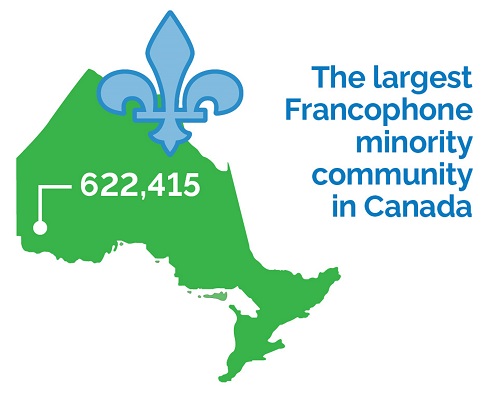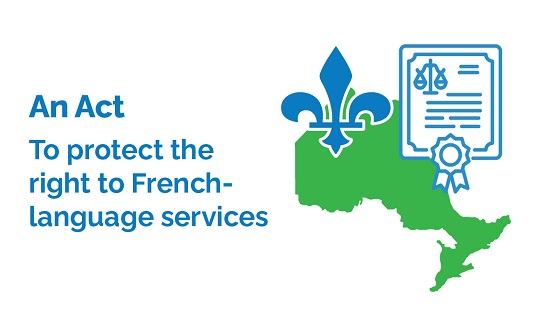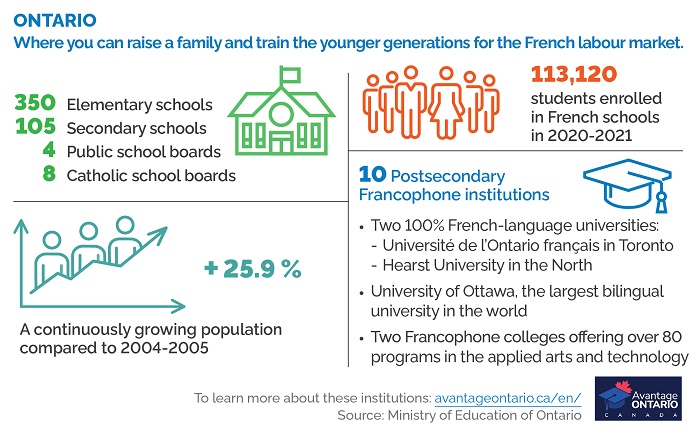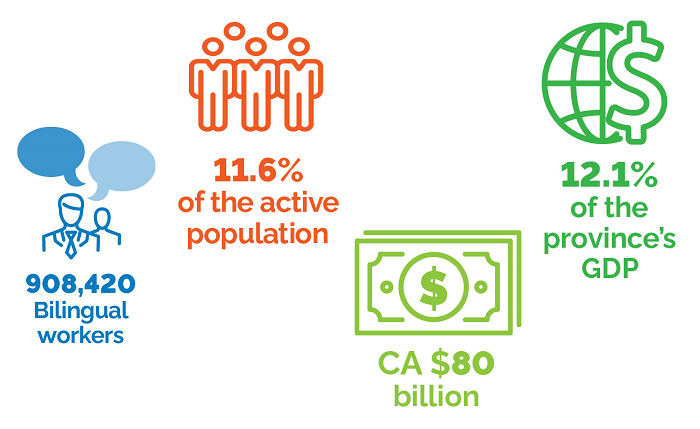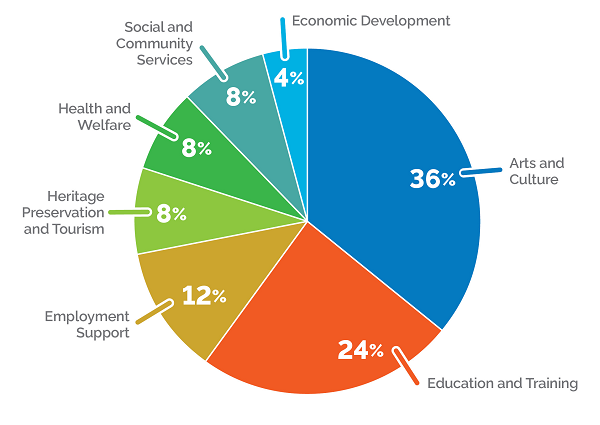2023 Report on Francophone Affairs
Read the 2023 report that highlights our efforts to support the social, cultural and economic development and influence of Ontario’s Francophone community.
Minister's message
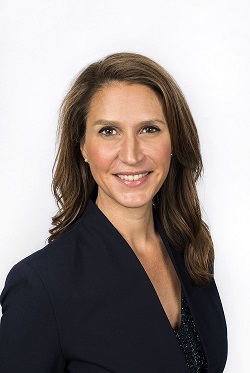
The Honourable Caroline Mulroney, Minister of Francophone Affairs
Mr. Speaker,
I hereby present the second annual report on Francophone Affairs. It gives me great pride to highlight the efforts made to support the social, cultural and economic development and influence of Ontario’s Francophonie and the achievements of our government in this area.
This report identifies our accomplishments and progress in 2022–2023, as well as our commitments and initiatives to promote Francophone Ontario nationally and internationally in the future.
This document is also part of an improved planning and evaluation process within the Ministry of Francophone Affairs. The ministry continues to implement its strategies to ensure that Ontario’s Francophone community is able to access high-quality services in the language of its choice, and to get the support it needs to fully contribute to Ontario’s prosperity and growth.
Through the efforts of the Ministry of Francophone Affairs across the public service and the work of our partner ministries, our stakeholders and the Francophone community, we have seen great progress on several fronts over the last year.
The Francophonie is a tremendous asset for Ontario, and our government is committed to supporting its growth, both here and beyond our borders. Its vitality, diversity and openness make Ontario’s Francophonie a source of pride and enrichment for our province.
Our province is fully prepared and indeed eager to work with the extended Canadian and international Francophone family to strengthen exchanges and cooperation in the areas of culture, education and economic development.
Serving Ontario’s Francophones continues to be central to our core mission. That is why it is essential for us to continue to take their needs and concerns into account, and to ensure that we are attentive to the issues that affect them. I hope our Franco-Ontarian community will appreciate reading this report and what it represents: our firm commitment to building Ontario with them and for them.
I am pleased to see a new reality taking shape for our vibrant and diverse Francophonie, and am proud to work alongside people committed to the vitality and sustainability of the province’s Francophone community. Bilingualism and French are precious assets. Thank you to my colleagues and to all Franco-Ontarians for believing in and working so hard to preserve and enhance these assets, for the greater benefit of our society and for our province as a whole.
The Honourable Caroline Mulroney
Minister of Francophone Affairs
Introduction
Ministry’s mandate and role
The mandate of the Ministry of Francophone Affairs is to ensure that all Franco-Ontarians receive government services in French, and to encourage their full participation in the social, economic and political life of the province while honouring their linguistic and cultural heritage.
Profile of Francophones in Ontario
Franco-Ontarian Flag
Francophones are an integral part of Ontario and have shaped the province’s identity. The Franco-Ontarian flag has been a symbol of Ontario Francophonie since its creation in 1975. In 2021, it became the official emblem of Ontario, displayed in the Legislative Assembly alongside the Canadian and Ontario flags. It consists of two vertical bands, green and white. The first contains a white lily, evocative of the Canadian Francophonie; the second contains the outline of a green trillium, the floral symbol of Ontario. The green stands for summer, and the white for winter, together representing the diversity of Ontario’s climate.
622,415 francophones, the largest Francophone minority community in Canada.
(Source: Census based on an inclusive definition of Francophone, Statistics Canada 2016)
Since 2009, the government of Ontario has used an inclusive definition of Francophone to encompass all persons whose mother tongue is French. It also includes those whose mother tongue is neither French nor English, but who have a good working knowledge of French as an official language and who use it at home. This definition therefore includes newcomers to Ontario.
In 2022, Statistics Canada released key data from the 2021 Census. According to this data, Ontario continues to be home to Canada’s largest Francophone community outside of Québec. The Ministry of Francophone Affairs will receive data compiled in accordance with the inclusive definition of Francophone in the course of 2023.
French-Language Services
Update on Ontario’s French-Language Services Strategy
Background
Launched in November 2021, this strategy focuses primarily on increasing the availability, accessibility and quality of the French-language services to which Francophones are entitled.
The strategy encompasses three pillars:
- Modernizing the legislative framework
- Growing the Francophone and bilingual workforce
- Service planning and delivery
Below is an overview of the progress made under each of these pillars.
Strengthened legislative framework
The first phase of this strategy was to overhaul the French Language Services Act in 2021. For the first time in 35 years, the Act was amended in a meaningful way to respond to the needs and aspirations of the Francophone community. In addition to ensuring that ministries, government agencies and third-party organizations providing services in French are more accountable for the delivery of such services, the modernized Act establishes Active Offer the cornerstone of access to quality French-language services.
The modernized Act received Royal Assent on December 9, 2021.
An Act to protect the right to French-language services.
The French Language Services Act, passed in 1986 and modernized in 2021, aims to ensure access to quality front-line French-language services.
Advances in French-language services
New regulation supporting Active Offer
On December 6, 2022, the Ministry of Francophone Affairs created a new regulation that clarifies the definition of Active Offer and outlines its application.
The practice of Active Offer means making French-language services available from first point of contact between Ontarians and the agencies providing those services.
The new regulation contains nine specific measures that ministries, government agencies, designated agencies, and third parties providing services on behalf of the government must follow. This regulation came into effect on April 1, 2023.
Regulation on Active Offer
The new regulation sets out measures for implementing the Active Offer of services in French. These measures apply to the following:
- Introducing users to the services
- Electronic or pre-recorded public messages
- Public signs, posters, information and documents that are related to the services
- Web pages and social media content
- Establishing processes to ensure that users of the services receive them in the language of their choice at each stage of the service, without having to request it.
Ontario is now one of the jurisdictions in Canada that has the most comprehensive legislative framework for the Active Offer of services in French.
The ministry is also working on developing and updating other regulations, in particular:
- Regulations on designated regions and agencies, to keep this information up-to-date
- A regulation that would allow for the designation of French-language points of service outside of designated regions, in collaboration with relevant ministries and their agencies.
Progress in Sarnia!
The City of Sarnia will soon become the latest region designated under the French Language Services Act. Ministries and government agencies continue to make progress in planning the implementation of French-language services, so that provincial services will be available when this designation takes effect on November 1, 2024.
Designated agencies under the French Language Services Act
Updates to Ontario Regulation 398/93: Designation of public service agencies
In 2022–2023, four agencies were designated under the French Language Services Act: the Foyer St. Jacques Nursing Home in Embrun, a long-term care facility; the Timmins Community Health Centre; the Montfort Academic Family Health Team in Ottawa; and Timiskaming Home Support, which provides services to seniors and to adults with physical disabilities. Three of these agencies report to the Ministry of Health and the fourth to the Ministry of Long-Term Care. Three other agencies with previously designated services expanded their services: Counselling and Family Service Ottawa; Renfrew Victoria Hospital; and Children’s Hospital of Eastern Ontario — Ottawa Children’s Treatment Centre.
Ontario Regulation 398/93, which includes the list of designated agencies, is being updated by the Ministry of Francophone Affairs. In fact, about 15 amendments have already been made to reflect administrative changes to the names of sponsoring ministries, and of the designated agencies or their designated programs. The ministry continues to work with partner ministries to update the entire list.
Optimized online platform for managing applications to designate agencies
The ministry digitized the process to designate agencies under the French Language Services Act, and launched this online tool in early 2022. Digitalization makes it possible to process applications faster and more accurately. It now takes a maximum of 12 months, whereas it used to take as long as 36 months.
The ministry is adding more functionality to the platform in 2023, including facilitating the triennial evaluation process for organizations.
Laurentian University designation: follow-up
The Ministry of Francophone Affairs and the Ministry of Colleges and Universities continue to work with Laurentian University to respond to the recommendations made in March 2022 by the former Ontario French-Language Services Commissioner in her report titled Strengthening the Designation: a Collaborative Effort. The Ministry of Francophone Affairs will complete an update of its evaluation policy in 2023 to support ministries in auditing the compliance of designated agencies with the French Language Services Act, and in the quality assurance process for French-language services. In addition, the online tool mentioned above will make it possible to do regular follow-ups with all designated agencies. These may include updated information and reminders regarding the requirements for designation under the Act.
Developing a Skilled bilingual workforce
In order to ensure an Active Offer of services in French, ministries, agencies and providers must have skilled bilingual staff. That is why the development of this workforce is an essential component of the French-Language Services Strategy, as it is for the Francophone Economic Development Strategy. To this end, the Ministry of Francophone Affairs works closely with other ministries that have a workforce mandate.
Immigration is central to increasing the Francophone workforce. Ontario is working with the federal government to increase Francophone immigration to Ontario. In 2022, Ontario reached its 5% Francophone immigration target for the first time. Of the total number of newcomers to Ontario, 5.3%, or 9,760 people, were Francophone.
Newcomer Settlement and Language Training Program
Newcomer settlement services offer multilingual guidance, information and other supports to help newcomers successfully integrate into Ontario communities. Last year, 77,000 newcomers received settlement services, including 3,500 Francophones.
Seven Francophone settlement organizations receive funding from the government of Ontario to serve Francophone newcomers in the Toronto, Ottawa, Peel, Hamilton, Niagara, Windsor and Durham Regions.
Adult language training provides language proficiency assessments and courses in English and French as a second language. These help newcomers develop the communication skills they need to successfully integrate into the community and the workforce.
47,000 clients accessed language training in the 2021–2022 school year, including 4,400 learners who participated in French as a second language training provided by seven school boards in Toronto, Ottawa and the Halton and Peel Regions.
Employment Services
Employment Services provides one-stop resources, support and services to meet career and employment needs. These are often the first points of contact for persons who need help finding a job.
The employment services network includes more than 140 third-party service providers and service system managers, offering over 250 service delivery sites across the province.
As part of their service delivery, each office provides job search assistance, labour market resources, placements, training and a variety of other supports. In 2021–2022, over 4,200 Francophones used employment services.
Skilled professionals in early childhood education
In March 2022, Ontario, along with the government of Canada, announced the adoption of the Early Learning and Child Care Agreement (ELCC Agreement), with $13.2 billion in funding to provide Ontario families with more affordable, accessible and inclusive high-quality child care.
According to the Canada-wide ELCC Agreement, Ontario is committed to meeting or exceeding the number of French-language child care spaces for children aged 0 to 5, proportional to its Francophone population.
In 2022–2023, the Association francophone à l’éducation des services à l’enfance received nearly $750,000 under the Canada-Ontario Early Learning and Child Care Agreement and $350,000 in one-time funding from the Agreement for career development projects. This funding is used to improve culturally relevant programming and the delivery of high-quality child care and early childhood services in French.
As of March 2022, 274 French-language child care centres in French-language schools offered 33,907 spaces. The majority of these centres, or 269, were in elementary schools, and the remaining five were in secondary schools. Eight school-based bilingual child care centres were located in French-language schools, representing a total of 889 spaces.
Canada-Ontario Agreement on French-Language Services
Thirty-two projects sponsored by provincial government ministries and entities received funding under the 2018–2023 Canada-Ontario French-Language Services Agreement. The objective of this agreement is to support the creation of new services in French, as well as to fund projects to improve existing services. During the first four years of the 2018–2023 agreement, the federal portion of the funding amounted to $5.6M and Ontario’s contribution totaled more than $12.3M.
For example, one of these projects helped provide psychotherapy services to Francophones through a partnership between the Montfort Hospital and the Royal Ottawa Health Care Group. This initiative took advantage of the videoconferencing resources of the Ontario Telemedicine Network, which allows patients to access mental health services remotely. Another project involved the purchase and installation of three electronic highway signs in Eastern Ontario that simultaneously display messages in English and French, helping to reduce distractions on the highway.
Planning and accountability
Advances in planning and accountability
Francophone Human Resource Capacity Planning
The Ministry of Francophone Affairs worked with the Treasury Board Secretariat to strengthen the planning of French-language services and to support the recruitment of a workforce with the appropriate skills to provide such services. All ministries must integrate French-language services into their planning, and report annually through the multi-year budget planning process. The Treasury Board Secretariat and the Ministry of Francophone Affairs are currently working on an initiative to strengthen the bilingual public service workforce to enhance the government’s ability to provide services in French. The priority areas for this initiative are recruitment, retention, training, and the management and collection of data related to positions designated as bilingual by the Ontario Public Service.
Progress in key areas
In their reports on French-language services, the ministries highlighted several noteworthy achievements.
Education and community services
Support measures for learning French are offered to the families of students who attend French-language schools, specifically through tutoring and the learning camps made available by Eureka! This free virtual support service offers one-on-one tutoring in all school subjects to students in grades 1 to 12 who attend French-language schools in Ontario.
Illustration showing the student population and the number of Francophone educational institutions in Ontario
- 350 Elementary schools
- 105 Secondary schools
- 4 Public schools boards
- 8 Catholic school boards
- +25.9% a continuously growing population compared to 2004–2005
- 113,120 students enrolled in French schools in 2020–2021
- 10 Postsecondary Francophone institutions
- Two 100% French-language universities:
- Université de l'Ontario français in Toronto
- Hearst University in the North
- University of Ottawa, the largest bilingual university in the world
- Two Francophone colleges offering over 80 programs in the applied arts and technology.
To learn more about these institutions, visit: avantageontario.ca/en/
(Source: Ministry of Education of Ontario)
Ontario’s French Teacher Recruitment and Retention Strategy (2021–2025)
Since the launch of this strategy, the Ministry of Education and the Ministry of Colleges and Universities have achieved the following:
- Creation of an implementation committee chaired by the Ministry of Education and made up of key partners in French education
- Development of the recruitment portal on enseignerenfrancais.ca, as well as virtual job fairs organized in Francophone countries; La passerelle — En route vers l’Ontario of the Centre franco currently lists over 140 potential candidates for teaching in French and residing abroad
- New Ontario College of Teachers pilot project to allow newly graduated teachers from France to apply for accreditation
- Preparation of flexible teacher education models by the ministry in collaboration with academic institutions, including the Université de l’Ontario français, which expanded its program offerings by adding a B.A. in education. The university opened its program to part-time students in January 2023 and will make it available to full-time students in September 2023.
Training
The shortage of Francophone and bilingual workers particularly affects the health, education, early childhood, and social and community services sectors. The Ontario government takes this situation very seriously.
In 2022, the Ontario government enhanced the Achievement Incentive Program, which provides financial incentives for employers when apprentices in the skilled trades meet the benchmarks for their training or certification.
To address anticipated labour shortages and barriers faced by both employer sponsors and apprentices, the province has added a new $1,000 payment for enrolments and additional payments of $1,000 per level and certification for any new apprentices who self-identify as being part of an under-represented group, such as Francophones.
Early childhood educator programs deal with training deficits by providing financial incentives to help people working in this field obtain a diploma in early childhood education or leadership credentials.
Langue des signes québécoise (LSQ) interpretation services
The Ministry of Children, Community and Social Services works with the Canadian Hearing Services, a transfer payment recipient, to improve the delivery of services to the hearing-impaired Francophone community so that they could receive services in their mother tongue. The project is ongoing and continues to improve LSQ interpretation in the area of training and education, standards and community education.
Health
The purpose of the FLS Locator Map of the Ontario Telemedicine Network (OTN) is to provide information about access to virtual health care in French. This online tool allows to specifically identify those health service providers that are designated. In fiscal 2021–2022, the designated organizations were added to increase the availability of access to virtual care in French. Twenty new health care providers have also been integrated to provide virtual services in French.
The Ministry of Health has been managing the French-Language Health Services Database (FLHSD) since March 2022. This database collects data from health service providers to determine their ability to deliver health care services in French. The Ministry of Health completed its first data collection cycle in August 2022. The ministry will use the data to create French-Language Health Services (FLHS) capacity reports. The ministry will then examine the possibility of combining FLHSD data with other ministry data to allow for a more thorough analysis of FLHS capacity. This will allow the ministry to better identify gaps in health services offered in French.
Accents on health cards
Since August 2022, Francophones in Ontario have the option of French-language characters such as accents (e.g., ç, è, é, ê, ë) on Ontario health cards. This is another step forward in the province’s plan to make French-language characters available on all Ontario government ID cards.
Long-term care
As of February 2023, there are 39 long-term care capital development projects in development across Ontario where operators have stated that they intend to serve the Francophone population of Ontario by providing cultural and linguistic services and/or by designating a portion of the beds for Francophones. In total, these 39 projects will provide 4,956 beds (3,166 new and 1,790 improved beds), some of which will help meet the demands and needs of diverse groups, including Francophone communities.
Finance
The Liquor Control Board of Ontario (LCBO) has adopted a new Francophone hiring strategy to resolve the ongoing challenges related to the recruitment of bilingual staff that have been noted in designated stores in recent years. Systematic efforts to identify, attract and test Francophone candidates resulted in the net hiring during the Fall of 2021 of 130 new Francophone casual employees in all regions of Ontario.
Tourism and culture
In November 2021, Science North hosted Science and Indigenous Ingenuity. This Francophone event explored the science behind the innovations of Indigenous peoples and celebrated Fête de la Science (hosted by the French government) and International Science Centre and Science Museum Day. The virtual event featured speakers, hands-on workshops and activities, and drew 1,861 participants from Ontario, Québec and Manitoba.
Justice
In 2022, Tribunals Ontario updated its French-Language Services Policy, which outlines its commitment to provide services in French, in accordance with its obligations under the French Language Services Act.
In addition, since February 1, 2022, court documents can be filed in French anywhere in the province for any type of proceeding, including criminal, civil and family cases. These changes will provide Francophones with more efficient and consistent access to the justice system.
The Ministry of the Attorney General has also launched a number of initiatives concerning access to justice in French. These include projects in partnership with the Chief Justices of Ontario to provide seamless and timely access to French-language services in the Ottawa, Sudbury and North Bay courts.
Francophone Economic Development
Francophone Economic Development Strategy
Background
The Francophonie is a major economic asset for Ontario, one that must be showcased and preserved for future generations. This is why, in the Spring of 2021, the Ministry of Francophone Affairs launched the Francophone Economic Development Strategy, the result of close collaboration with partner ministries and the Francophone business community.
Objectives
The Francophone Economic Development Strategy aims to expand the Francophone economic footprint, strengthen and promote the Francophone and bilingual workforce, stimulate job creation and foster the development of new markets for Francophone and bilingual businesses and organizations.
The actions taken by the Ontario government since 2022 reflect an approach that both supports the Franco-Ontarian economic ecosystem and ensures that a “Francophone lens” is applied to economic development programs of the provincial government.
Strategic framework
The programs and initiatives on which the strategy is based were created in response to issues raised by Francophone entrepreneurs and key economic stakeholders. They are grouped under three pillars. Ontario has made economic recovery a priority.
Ontario is a province where businesses can grow and thrive, where innovation is at the forefront, where diversity counts and where exceptional talent is at the table.
1. Francophone entrepreneurship and innovation
Entrepreneurship is central to economic growth and is therefore the first pillar of the Francophone Economic Development Strategy.
Illustrating the percentage of Francophone businesses in Ontario
- 30,150 Francophone SMEs (small and medium enterprises)
- 4.3% of Ontario businesses
- 50% of Francophone business outside of Quebec
(Sources: Statistics Canada 2022 and Invest Ontario)
Support for businesses
As part of its Francophone Economic Development Strategy, Ontario aims to support Francophone organizations and businesses and to foster an environment conducive to their growth.
According to a January 2022 report produced by Statistics Canada for Innovation, Science and Economic Development Canada, 4.3% of businesses incorporated in Ontario had at least one Francophone owner in 2017. This represents a total of 30,150 companies, or nearly 50% of Francophone businesses outside of Québec.
With a three-year annual allocation from the province of $500,000, or $1.5M in total, the Ministry of Francophone Affairs has been funding initiatives to support businesses in their incubation and implementation phases.
In 2022–2023, this investment supports among other projects the training of a cohort of entrepreneurs in Toronto, Ottawa and Sudbury, offered by the Conseil de coopération de l’Ontario (CCO). As part of this investment, La Cité is creating and piloting three audiovisual modules and complementary resource kits to help young entrepreneurs develop and implement their business projects.
Support for a Francophone economic ecosystem
Two years ago, the government of Ontario, through the Ministry of Francophone Affairs, supported the creation of the Fédération des gens d’affaires francophones de l’Ontario (FGA) to bolster the Francophone economy. Today, it has 15 founding members and encompasses 4,000 Franco-Ontarian companies and entrepreneurs. It has made tremendous strides in supporting Francophone entrepreneurship.
Initiatives implemented with the financial support of the ministry include business start-up and growth services offered by the Cooperation Council of Ontario, the virtual incubation program, Entrepreneuriat SÉO, the Société économique de l’Ontario, with a module specifically for black women entrepreneurs, and a mentoring program for young farmers established by the Union des cultivateurs franco-ontariens.
These economic development organizations, as well as the chambers of commerce, the network of French-language post-secondary institutions, associations representing key sectors and newcomer reception and integration services, must work together to foster the Francophone economy.
Since January 2021, the Fédération des gens d’affaires francophones de l’Ontario has been offering free conciergerie services and workshops to Ontario’s Francophone businesses in the following areas: exploring entrepreneurship, business creation (sole proprietorship or incorporated business), government funding for businesses, and securing contracts in public sector procurement.
As of March 31, 2022, 343 organizations were registered on the Quartier d’affaires portal: 193 French-language professional service providers (to connect verified service providers with companies looking for services), and 150 vendors of products or services to individuals (for the promotion of Franco-Ontarian products and services to the general Francophone public).
As of December 31, 2022, the new inkubo.ca portal had 25 organizations offering services in pre-incubation, incubation, implementation and acceleration across 118 programs.
2. Skilled bilingual workforce: education, training and employability
Ensuring the recruitment and retention of a skilled, bilingual workforce in key sectors of the economy is at the heart of the province’s Francophone Economic Development Strategy.
Through the Ministry of Francophone Affairs, the Ontario government funded the Association francophone à l’éducation des services à l’enfance de l’Ontario to create and pilot a recruitment and career integration tool for newcomers that will allow daycare owners to increase the staffing and availability of Francophone child care spaces.
The partner ministries of the strategy also funded many initiatives in education, training and support for Francophone workforce development through their own programs in 2022–2023.
Illustration of the Francophone active population and the number of bilingual workers in Ontario :
- 908,420 bilingual workers
- 11.6% of the active population
- 12.1% of the province's GDP, i.e. $80 billion
(Source: Conference Board of Canada, 2018)
Newcomer Settlement Program
In 2021–2022, the Ministry of Labour, Immigration, Training and Skills Development funded seven Francophone organizations to provide orientation, settlement, information and navigation services to Francophone newcomers in Toronto, the Peel and Durham Regions, Hamilton, London, Windsor, Ottawa, Kingston, Timmins and Sudbury. In total, more than 3,500 Francophone newcomers benefited from the program and 337 Francophone newcomers and international students participated in orientation workshops.
For the 2021–2022 school year, funding was also provided to seven school boards (three French and four English) to deliver 341 French as a Second Language (FSL) courses to more than 5,000 newcomers in Ontario. FSL courses are offered in the Toronto, Ottawa, Halton and Peel Regions.
Micro-credentials strategy
The Ontario government continues to improve access to French-language digital education and learning to support the transitions and labour market success of Francophone students and learners. As part of the Consortium d’apprentissage expérientiel francophone de l’Ontario, 33 students from the Université de Hearst participated in internship projects on a collaborative virtual experiential learning platform in 2021–2022. The platform allows educators and students to connect with industry partners and employers so that they may work remotely on real business challenges to earn course credits.
Bridge Training
The Ontario Bridge Training Program, administered by the Ministry of Labour, Immigration, Training and Skills Development, is designed to help newcomers with international training to find a job in their field, without having to go back to school or acquire other skills.
In 2021–2022, 243 Francophones benefited from employment integration services offered in French by La Cité, Collège Boréal and ACCES (Accessible Community Counseling and Employment Services) under this program.
Three Francophone projects were selected for funding in 2021–2022 under the Ontario Bridge Training Program. Approximately $2.7 million will be invested in these projects from October 2021 to Fall 2024.
Pre-Apprenticeship Training Program
The pre-apprenticeship program introduces people to careers in the skilled trades by providing them with the technical and employability training they need to start an apprenticeship in a specific trade. Proposals for pre-apprenticeship projects must focus on strengthening the autonomy of workers and job seekers who face greater barriers to entry. These projects are also intended to improve access to meaningful and gainful employment, especially for youth (including at-risk youth), women, Indigenous peoples, people of colour, newcomers, 2SLGBTQI+ and members of at-risk and/or marginalized communities.
With funding from the Ministry of Labour, Immigration, Training and Skills Development in 2021–2022, Collège Boréal and La Cité were able to train more than 100 Francophones in the following skilled trades: electrical construction and maintenance, automotive service technician, heavy duty equipment technician, teaching assistant and child development worker.
Skills Advance Ontario
This program supports partnerships that connect employers with training services in key sectors. As part of this program, job seekers were able to take advantage of sector-specific training and employment services, and were also connected with potential employers. In 2021–2022, the Ministry of Labour, Immigration, Training and Skills Development funded three projects (Prescott-Russell Employment Services Centre, City of Ottawa and Carrefour Communautaire francophone de London) to train 328 Francophones.
3. Promoting Ontario’s Francophonie as an economic asset
To support and promote the Franco-Ontarian economy, we also need to reach beyond provincial borders, in Canada and internationally.
In November 2022, the government of Ontario sent an official delegation to the 18th Summit of La Francophonie, held in Djerba, Tunisia. This biennial event attracts heads of states and government from French-speaking countries.
This mission raised the profile of the Ontario Francophonie among the 88 governments and member countries of the Organisation internationale de la Francophonie (OIF). It built relationships with business leaders and executives, allowing them to explore opportunities for cooperation in key sectors and promoted Ontario as a destination of choice for international Francophone students and for professionals and skilled workers.
As part of the Summit, the Ministry of Francophone Affairs signed a Memorandum of Understanding between the Province of Ontario and the French Community of Belgium, the first such agreement with an international partner. The memorandum aims to support cooperation between Ontario and the Fédération Wallonie-Bruxelles in the areas of higher education, economic and digital Francophonie, research, culture and youth.
The OIFs observer status allows Ontario to position the Francophonie as a major economic asset for the province, as well as a source of expertise and resources. We can now consider partnerships with members of the international Francophonie in specific areas, such as producing and disseminating digital educational content and developing women’s entrepreneurship.
Strengthening ties with Québec
Since 2021, Ontario has allocated $250,000 annually to implement the Cooperation and Exchange Agreement between the government of Québec and the government of Ontario with respect to the Francophonie. The agreement promotes common initiatives in culture, education, early childhood and health, and the funding supports new collaborative projects between Ontario and Québec Francophones. The 2022–2023 call for proposals provided financial assistance for 16 joint projects related to economic development, culture, education and tourism, for a total of $265,834.
In November 2022, the two provinces also announced the winners of the second edition of the Ontario-Québec Francophonie Trade Award, which celebrates and promotes excellence in the Francophone business community. Since 2021, this annual award has recognized one company in Ontario, and one in Québec, whose use of French serves to facilitate interprovincial trade. The winners in 2022–2023 are Ferme Avicole Laviolette (Ontario) and Humance (Québec), a human resources consulting firm.
Francophone Community Grants Program
The Ministry of Francophone Affairs has been managing the Francophone Community Grants Program for several years. This flagship program supports social and community organizations and businesses that contribute daily to the vitality and sustainability of Ontario’s Francophonie.
In 2021, the program’s funding budget was doubled to $2 million to increase its impact and to support a greater number of promising projects. The government announced funding for 50 projects in 2022–2023, including 43 projects under the Community and Culture stream and seven under the Development stream for a total of $2,001,102.
The 50 projects selected provide programming at the local, regional or provincial level and include initiatives aimed in particular at:
- Fostering and promoting cultural organizations by supporting events that increase their visibility and favour diversity within Francophone communities
- Training young adults and newcomers to facilitate their insertion into the job market, their integration into Francophone communities and their contribution to the growth of Ontario’s Francophonie
- Developing new online and in-person services to serve Francophones better, including vulnerable individuals (services offered to seniors, mental health counselling services, workshops on bullying and discrimination, workshops on diversity and inclusion, etc.)
- Building the capacity of Francophone organizations to recruit and retain a bilingual Francophone workforce
- Providing additional supports to Francophones at risk such as individuals with limited literacy or victims of violence.
Activity sectors of Projects Selected in 2022–2023
Pie chart displaying the percentage of projects funded under the 2022–2023 edition of the Francophone Community Grants Program, by sector of activity. Out of the 50 projects selected that year, 36% were in the area of arts and culture, 24% in education and training, 12% in employment support, 8% in heritage preservation and tourism, 8% in health and well-being, 8% in social and community services and 4% in economic development.
Conclusion
Ontario is in a unique position thanks, among other things, to a Francophone community that is increasingly diverse. It is the image in microcosm of a global Francophonie, multi-faceted and with multiple accents.
The Francophonie represents a major asset for Ontario’s development and prosperity, one that deserves to be strengthened and showcased. Ontario is committed to the ongoing implementation of its two complementary initiatives: the French Language Services Strategy and the Francophone Economic Development Strategy. This comprehensive and integrated approach involves all stakeholders in government, organizations and the business community. In its continued efforts to pursue these strategies, Ontario intends to seize every available opportunity to develop meaningful relationships with Ontarian, Canadian and international partners.
This strategic and coordinated approach will produce concrete results, supporting and promoting Ontario’s Francophonie and extending its reach beyond provincial boundaries, in Canada and abroad.
2022 will remain a memorable year punctuated with highlights and milestones for the advancement of Ontario’s Francophonie. These achievements reflect an ambitious direction and a promising future for the Franco-Ontarian community.
